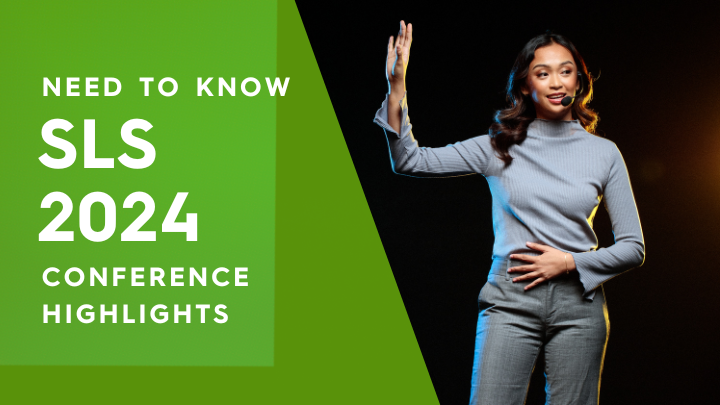
This year’s Sustainability Leaders Summit in Melbourne was, as always, a highlight of the sustainability calendar, packed with learnings and opportunities for businesses to better prepare for a green future and embed sustainability into their everyday operations.
With so much to cover, however, you’d be forgiven for losing track of some of the key points. And if you didn’t get the chance to attend the Summit this year itself, we don’t think it’s fair you should miss out.
So, as a reminder or to fill you in, the four team members who attended SLS 2024 have put together their thoughts on the key takeaways from this years conference. Let’s dive in!
Kristel Scozzaro, Business Development Specialist
Lots to cover at this year’s summit!
Justine Felton (Group Social Sustainability Manager at Stockland) acknowledged a big shift into the mentality around sustainability. Actions are not the sole responsibility of the sustainability team anymore - the sustainability team merely acts as an enabler while actions need to be delivered across the business itself. This is the only way to upscale climate action to meet deadline and targets.
Dr Sheila Nguyen also acknowledged the change of energy and tone in the conservation between last year's conference and this year. Discussion now evokes ''team work'' and refer to sustainability as a "group activity". To enable action, the session talked about the importance to operationalize strategy and grounding ideas into tangible actions while linking it back to business value. Start small, democratize the work, test, and take the leap.
We need to design solutions within the value chain - problems can't be solved at an individual/single business level, we need a collaborative approach that make sense operationally and economically. This is where government regulations can add value in speeding up change. Mandatory disclosure should be tackled as an opportunity, so that sustainability provides an incentive to work better, instead of being an opposing force to business.
Lastly, we must avoid fear in the pursuit of sustainability. 58% of surveyed business have decided to decrease their communication on climate action and achievement, fearing that they will be accused of greenwashing should they not have robust data. They’re engaging with greenhushing.
However 93% of business do recognize that communication is the key tool to drive a business success!
So, the solution:
- Start with purpose: what's your why? Reveal the most impactful thing you can in your business
- Be transparent and honest on where you are, internally and publicly.
- Be vulnerable, reach out, ask for help.
Will Smith, Business Development Specialist
For me, the theme that stood out at this year’s summit was the discussion around regulation: how it’s either already here or on its way. That requirements are going affect more and more businesses, so it’s time to prepare now. It’s time to educate yourself now.
Scope 3 was a particular point of contention. There are regulatory requirements in Australia, via NGERS, that encompass Scope 1 & 2, but not Scope 3 – yet. So a lot of the discussion focused around Scope 3, and how it’s hard to do. My reaction is that, while that’s true for some parts of Scope 3, our experience with Scope 3 is that it’s absolutely doable. Yes, it’s significant, and yes, Scope 3 can be difficult compared to Scope 1 & 2, but that shouldn’t be making businesses quake in their boots. You just need the right perspective and the right tech to enable your team.
Benji Hall, Sales Director
Collaboration. That was the name of the game for me at this year’s Summit.
Collaboration within the business; there were several significant sessions that covered engaging with the wider business around sustainability and breaking down silos. Everyone has a part to play and a responsibility around business emissions.
Collaboration across businesses. I remember the story about how these massive international hotel chains came together to agree around the NetPositive platform and the idea of ‘social offsets’ for their emissions (rather than buying carbon credits). They came together as a sector, despite being direct competitors, to find a way forward.
Lastly, collaboration across society. Several speakers discussed the importance of obtaining a social contract to operate in a sustainable way, highlighting the role of First Nations in this pursuit, as well as the importance of linking the purpose of your business to sustainable outcomes.
Overall, it was all about working together – a fitting and optimistic theme for the future of green in Australia.
Dan Tomlinson, Head of Market & Partnership
There were plenty of takeaways from this year’s summit. These are the ones I think were most notable:
- Regulation, regulation, regulation (with dancing): The biggest shift in the last year has been impending regulation. Interestingly, while that is on everyone's mind, many speakers have emphasised the big picture and looking beyond near term compliance.
- Embedding: It's all about embedding, but what does that mean? We heard numerous examples, but essentially - given the increasing expectations placed on organisations the drive is to move sustainability beyond defined teams (they will get this done) to distributed teams and ultimately having sustainability diffused across all business functions (all of us will get this done).
- Journey: While companies feel that ASRS puts them on a timeline, it is really about a journey of continuous improvement and evolution. Companies need to prepare for a marathon, not a sprint (but it will be a sprint if they delay too long).
- Scope 3 is Opportunity: We know Scope 3 is hard, but it's also the gold. Our response to climate change will be "won or lost" in how we approach this challenge. Lean in and go for it.
We heard a lot of stories about Scope 3 successes, including Cameron Ginn talking about the Fulton Hogan Scope 3 journey.
Looking forward to seeing what’s in store for next year!


